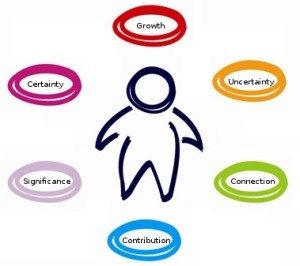In the first part of this series we introduced Six Human Needs Psychology. Even though we haven’t gone into much depth yet, I hope you can see how radical it’s impact can be on helping you understand the driving force behind your actions and behaviors.
If you missed the article, you can read it HERE and get up to speed.
 Now let’s get into more detail about each of the Six Human Needs…
Now let’s get into more detail about each of the Six Human Needs…
Here they are:
1. Certainty – This is the need for stability and safety. People that value certainty prefer things to be predictable and steady. They try to control their environment and keep things consistent. Surprises and unforeseen events and circumstances stress them out.
2. Uncertainty/Variety – This is the need for change. I know – ironic right!? We just got done talking about certainty. People that value uncertainty highly like surprises and change. They like feeling alive and the rush and excitement of unpredictability. They are always looking for new things to do or feel. They get bored easily. They live by the phrase “variety is the spice of life”.
3. Significance – This is the need to feel important, special, or unique. To have a sense of identity, meaning, and purpose. People will try to fulfill this need in many ways – from having lots of tattoos, academic degrees, material possessions, or anything else that sets them apart from others.
4. Love/Connection – This is the need to feel a connection with something or someone – it could be yourself, others, an animal, or anything else. This is about an intimate, close bond and feeling one with something. Love is the higher form of connection but many people choose to avoid it because of the vulnerability associated with opening up fully.
5. Growth – This is about becoming more and growing as a person. Whether it’s getting better at a skill, learning something new, or becoming more spiritual. It’s about moving forward and improvement to better oneself.
6. Contribution – This is giving to others and being conscious and supportive of a greater cause. The focus isn’t on yourself or how you can benefit by giving, but giving with no other intent than pure generosity and altruism.
Whew – got it? Not too bad right?
Now remember that everyone tries to meet all of these needs in some way (well at least the first 4 – not necessarily the last 2) but the top 2 are our Driving Force.
Let’s look at a couple example behaviors and what need(s) they could be meeting. We’ll take a negative as well as a positive example behavior to show you how people can meet their needs in both disempowering and empowering ways.
How about the behavior of gossiping? What needs does it or might it meet?
- Certainty – you’re pretty certain that you’ll get a reaction from the listener and that they’ll be interested in what you’re talking about
- Uncertainty – you’re telling something exciting that is stimulating and produces a “rush” to some extent (otherwise it wouldn’t be gossip)
- Significance – you feel important and special because you know this “insider” information
- Love/Connection – you’re connecting with the listener
- Growth – not so much
- Contribution – nope
Does that make sense? Let’s try another one…
How about volunteering at an animal shelter?
- Certainty – you’re pretty certain that you’ll feel a certain way volunteering and you might know your duties and skills
- Uncertainty – new animals and situations provide variety. You don’t know if the animals will get adopted. There’s a degree of unpredictability involved.
- Significance – you might feel important because the animals need you. You might also get recognition from others for your efforts.
- Love/Connection – you’re connecting with the other volunteers, yourself, and the animals
- Growth – you’re working on becoming a better, more caring and compassionate person
- Contribution – you’re helping and contributing beyond yourself to make the world a better place
Got it?
I want to just point out a very important thing here.
I gave you a bunch of possible reasons for both of those behaviors but we can’t ever assume we know the reasons why people do the things they do.
Their reasons (and the needs they’re trying to meet) can be very different than what we may think or why we might do that activity.
We’ll finish up this series in Part 3, which will answer the question…
“Who cares and why is this whole thing important?”

